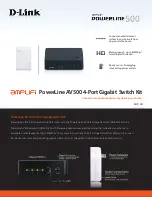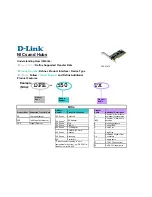
283
EKI-9500 Series User Manual
IGMP Type
The TCP/UDP destination port to match in the packet header. Select
one of the following options: Equal, Not Equal, Less Than, Greater
Than, or Range and specify the port number or keyword. TCP port
keywords include BGP, Domain, Echo, FTP, FTP Data, HTTP, SMTP,
Telnet, WWW, POP2, and POP3. UDP port keywords include Domain,
Echo, NTP, RIP, SNMP, TFTP, TIME, and WHO. The function is only
available for IPv4 Extended and IPv4 Named ACLs.
ICMP Type
IP ACL rule to match on the specified IGMP message type. This option
is available only if the protocol is IGMP. The function is only available
for IPv4 Extended and IPv4 Named ACLs.
ICMP Code
IP ACL rule to match on the specified ICMP message code. This
option is available only if the protocol is ICMP. The function is only
available for IPv4 Extended and IPv4 Named ACLs.
ICMP Message
IP ACL rule to match on the ICMP message type and code. Specify
one of the following supported ICMP messages: Echo, Echo-Reply,
Host-Redirect, Mobile-Redirect, Net-Redirect, Net-Unreachable, Redi-
rect, Packet-Too-Big, Port-Unreachable, Source-Quench, Router-
Solicitation, Router-Advertisement, Time-Exceeded, TTL-Exceeded,
and Unreachable. This option is available only if the protocol is ICMP.
The function is only available for IPv4 Extended and IPv4 Named
ACLs.
TCP Flags
IP ACL rule to match on the TCP flags. When a + flag is specified, a
match occurs if the flag is set in the TCP header. When a - flag is spec-
ified, a match occurs if the flag is not set in the TCP header. When
Established is specified, a match occurs if either RST or ACK bits are
set in the TCP header. This option is available only if the protocol is
TCP. The function is only available for IPv4 Extended and IPv4 Named
ACLs.
Service Type
The service type to match in the IP header. The options in this menu
are alternative ways of specifying a match condition for the same Ser-
vice Type field in the IP header, but each service type uses a different
user notation. After you select the service type, specify the value for
the service type in the appropriate field. Only the field associated with
the selected service type can be configured. The function is only avail-
able for IPv4 Extended and IPv4 Named ACLs.
The services types are as follows:
IP DSCP: Matches the packet IP DiffServ Code Point (DSCP)
value to the rule. The DSCP value is defined as the high-order six
bits of the Service Type octet in the IP header.
IP Precedence: Matches the IP Precedence value to the rule.
The IP Precedence field in a packet is defined as the high-order
three bits of the Service Type octet in the IP header.
IP TOS Bits: Matches on the Type of Service (TOS) bits in the IP
header. The IP TOS field in a packet is defined as all eight bits of
the Service Type octet in the IP header. For example, to check
for an IP TOS value having bits 7 and 5 set and bit 1 clear, where
bit 7 is most significant, use a TOS Bits value of 0xA0 and a TOS
Mask of 0xFF.
–
TOS Bits: Requires the bits in a packet's TOS field to match
the two-digit hexadecimal number entered in this field.
–
TOS Mask: The bit positions that are used for comparison
against the IP TOS field in a packet. Specifying TOS Mask is
optional.
Item
Description
















































